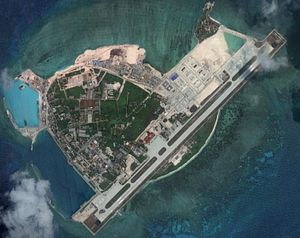On Sunday, Chinese state media reported that a new desalination plant had been activated on Woody Island in the South China Sea.
According to Xinhua, the equipment “is capable of treating 1,000 tonnes of seawater per day and 700 tonnes of processed water is directly drinkable.”
Woody Island, known as Yongxing Island in Chinese, is the largest of the Paracel Islands and China’s largest permanent outpost among the disputed features in the South China Sea.
Around 1,400 personnel, mostly with the People’s Liberation Army, are positioned on Woody Island, which is also claimed by Vietnam and Taiwan.
The activation of a desalination plant on a South China Sea feature is a notable first for China, with potential strategic ramifications.
As the South China Morning Post had reported earlier this year, “On most of the islands controlled by China in the South China Sea, drinking water comes in barrels together with other supplies from small boats, making it as scarce as fuel.”
With the activation of a desalination plant on China’s most militarized South China Sea outpost, Beijing improves its troops’ ability to endure longer during conditions that may have otherwise deprived them of important supplies at sea, including drinking water.
The Global Times, in late September, noted that troops and residents on Woody Island alike “rationed the use of fresh water due to inadequate supply.”
“The water they used were tap and bottled water shipped to the island, locally-purified rain and underground water,” it added, citing the Hainan Daily.
In due time, desalination facilities may make their way to China’s artificial islands in the Spratly group.
Desalination plants in the South China Sea could also enable important non-military projects, abetting China’s bid to assert its sovereignty over disputed features.
Reports earlier this summer noted that China is pushing tourism through state-sanctioned cruises to the Paracel Islands, for example.
Eventually, this may expand to include “hotels, villas, duty-free shops, tropical-themed commercial parks, and commercial streets,” a China Daily report underlined.
Sustainable desalination will be necessary to enable these initiatives in the South China Sea.
Woody Island, administered as part of Sansha city, is equipped with a 2.7 kilometer runway, capable of accommodating any fighter in the People’s Liberation Army-Air Force’s inventory.
Shenyang J-11 fighters have long been spotted on the island, in addition to HQ-9 surface-to-air missile systems and surveillance drones.
Moreover, China’s advanced YJ-16 anti-ship cruise missiles, with a 400 kilometer range, have been deployed to Woody Island as well.

































